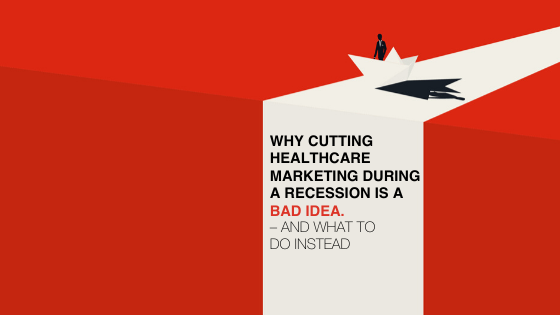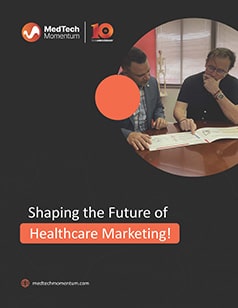
During times of a crisis, or a recession, your company has an incredible opportunity to rise above the competition. The key is to have a plan.
The instinct for companies at the onset of a recession is often to cut costs and expenses. And while protecting cash flow makes sense, a hard stop on marketing will do more damage than good.
“Although the natural inclination is to cut back… during a recession, those brands that maintain their ad budget and/or change their messaging can get a long-lasting boost in sales and market share.” – Brad Adgate, Forbes.
Marketing During a Crisis
What the COVID-19 pandemic has shown us, is that companies who prioritize taking action from a perspective of Corporate Social Responsibility, and who are effectively communicating that mission to the masses, are in fact cutting through the noise and contributing to tremendous actual and perceived good will.
Examples of this include Dyson making ventilators, New Balance producing masks instead of shoes, and Medtronic and Tesla partnering up to help meet the unprecedented demand for ventilators and medical devices to combat the maxed out capacity of the healthcare system.
Even if your business does not serve medical device manufacturing specifically, there may be opportunities to take what you do best and contribute to the greater good at the epicenter of the crisis, and NOT just proceeding with business as usual, which can come across as tone deaf. Proceed with empathy and creativity. A great example of this was West Elm, who offered free Zoom video conference backgrounds featuring high definition photography from their catalogs and website. With the enormous growth of remote working and video conferencing this was a masterful move.
But, is all that considered marketing?
Well, yes. It is fundamentally Content. With a capital C. The only way these companies, and all of the others proceeding similarly, have gotten the word out about what they’re doing has been through marketing communications efforts such as PR, social media, and email marketing – focusing on measurable, real-time digital channels.
During a crisis, the way your audience absorbs content and information may change as well, and companies must be prepared to pivot. With Stay at Home orders in effect across the globe, reduced travel, increased screen time, and the need for up-to-date information online, internet use at home has grown exponentially. Nielsen estimates that coronavirus quarantining will increase streaming video viewing by as much as 61%, while OpenVault, a provider of website usage data, has determined that business-hours broadband consumption increased by 41% in the week after COVID-19 was deemed a pandemic by the CDC.
Marketing During a Recession
“Marketing helps drive commerce. Marketers have an opportunity to give consumers a reason to spend—deals, products, services—even when we are bunkered up and hunkered down,” explained Bradley Johnson, comparing the looming post-coronavirus recession with the economy after 9/11 in 2001 in this article from AdAge. “The economy needs marketers and marketing,” Johnson continues.
Control what you can, but don’t stop communicating with your customers. When you maintain, or perhaps increase, your marketing budget and content production during a recession, you are primed to take advantage of:
- Lowered lead and bidding costs! As some companies spend less on clicks and re-targeting, for example, platforms deliver leads at a much lower rate, creating a “buyer’s market” for brands.
- Less competition for eyes and ears. With less noise in the marketplace it is easier to position your product or service
- Maintaining market share. Increase credibility and customer confidence by showing your company is fully operational in spite of an economic downturn.
Amazon is a great example of a brand that benefited by keeping their marketing engine running at an economic downturn. 2008’s Great Recession saw the stock market crash and unemployment reach 10%, but Amazon grew their sales by 28% with their focus on technology and new products – products like the Kindle, that offered a solution to customers left financially limited. The desire for content hadn’t changed, only the means by which to purchase it. Amazon focused on a solution, and not only maintained but grew their market share by leaps and bounds.
Simply put: Stopping and cutting your marketing efforts during a recession or in times of a crisis is a bad idea. The focus should be on providing solutions to your customer community and lead orbit – they just may not be the solutions you’re used to.
Next Right Steps
So, you might be asking yourself, “What do I do?”
The first thing to do is to pivot your traditional KPIs to better reflect your goals. If your goal is no longer to meet a certain number of leads, or a specific sales figure, but rather to stay afloat, to avoid layoffs, and maintain market share, then consider measuring metrics like improved customer experience, engagement, and loyalty.
Second, keep the focus on inbound marketing like the following digital marketing channels to maximize your message, streamline your resources, and effectively measure and track your ROI:
- Public Relations (PR)
- Have a Crisis Communications Plan in place
- Communicate Early and often
- Content & SEO
- Produce targeted keyword-specific blog posts and articles.
- Media outreach and link-building
- Webinars and video content
- Case studies and testimonials
- Social Media
- Engage your customer communities
- Don’t forget reputation management
- Email
- Maintain communication channels your community already trust
- Grow your databases to nurture and close new leads
Finally, go virtual. Companies need to simply streamline marketing resources and minimize fixed costs, in exchange for more variable costs. Migrating traditional marketing overhead costs to a more virtual solution may be your secret sauce.
By joining MedTech Momentum’s Virtual Marketing Membership program you get access to a fully operational, experienced marketing team. For the cost of one junior employee, you have 17 marketing professionals experienced in medical technology and healthcare marketing – and experienced in interfacing with clients virtually. Virtual Marketing is what we do.
There are many benefits of a virtual marketing department, not just including lower costs, and we’d love to connect and discuss how we can customize a plan that works for you.
Click Here to get started!



